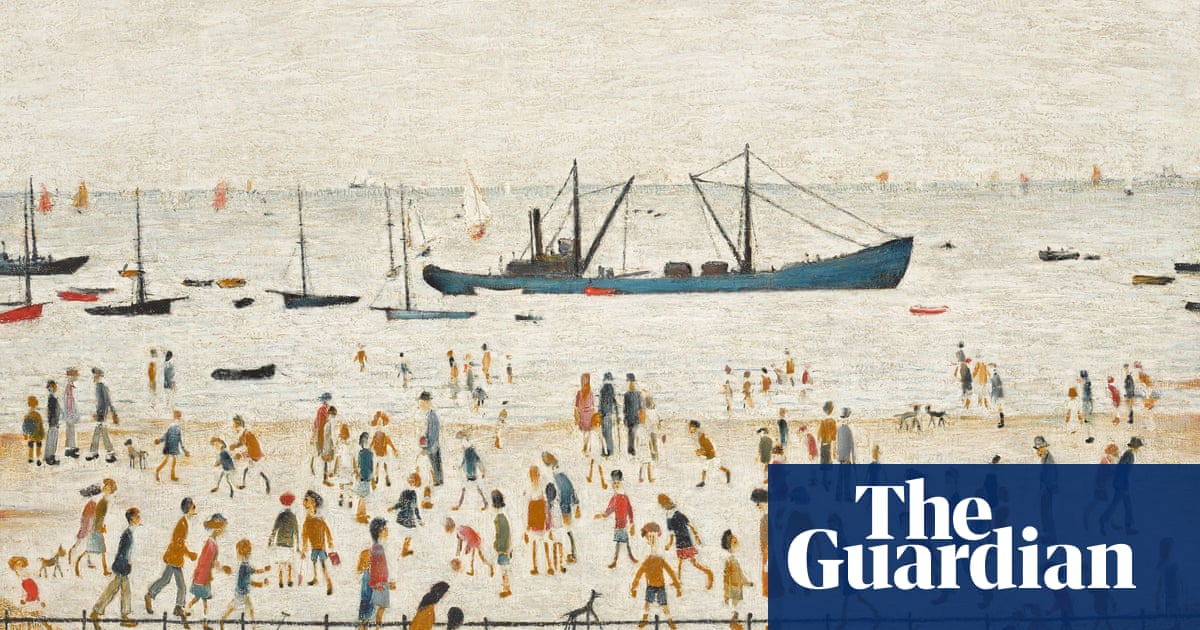
It is a beach painting full of cheerful hustle, bustle, play and paddling, though the jumpers and hats reveal it is a long way from Saint-Tropez. The 1947 work Beach Scene, Lancashire is a snapshot of an English summer’s day, probably in Lytham, and is considered one of LS Lowry’s finest seascape paintings.
Sotheby’s has announced that the work, which has been part of a Canadian collection for the last 70 years, is to go to auction later this month with an estimate of £1m-£1.5m.
“I think it is a remarkable painting,” said André Zlattinger, Sotheby’s head of modern British art. “It is very clever pictorially, those two figures in the foreground just set the picture off … it is one of the strongest Lowry’s I’ve ever had and it will be interesting to see how it’s received by the market.”
The painting was part of a 1952 show of “realist pictures by contemporary British artists” at the Whitechapel Gallery, London, and the following year it was shown at an exhibition of British romantic paintings arranged by the Arts Council of Great Britain.
It was bought in 1955 by the Canadian media baron and politician Lord Beaverbrook, one of the most influential figures in British society during the first half of the last century.
In 1959, Beaverbrook gifted it to the art gallery he funded and stocked in Fredericton, New Brunswick.
The Beaverbrook art gallery said it was selling its Lowry to fund future acquisitions.
Lowry is often thought of as nostalgic and a straightforward chronicler of gentler times – the man who “painted matchstick men and matchstick cats and dogs” and kids in “sparking clogs”, according to the Lowry-themed 1978 hit single by Brian & Michael – but exhibitions in recent years have revealed him to be as complex as anyone else.
His seascapes are sometimes bleak and desolate, reflecting the depressions and loneliness he encountered.
Beach Scene, Lancashire is large, at more than 1 metre wide framed, and is full of life. “It is one of his finest seascapes and from his mid-period when he was at his best,” said Zlattinger.
Lytham St Annes was a place Lowry knew well, with many family holidays spent there in his youth. One of his Lytham paintings was also, it is said, the only one that his mother expressed any inkling of a liking for.
The beach scene is one of five Lowry works being sold at the auction in London on 21 November. Three of them are oil paintings, including the 1957 work Up North, a title seen as Lowry having fun with his growing southern audience. It has the matchstick figures, terrace houses and smoking chimneys he is most remembered for.
It also shows off his palette, which was only five colours – flake white, ivory black, vermilion red, Prussian blue and yellow ochre.
Lowry only started using flake white, particularly in skies, after one of his teachers, the Manchester Guardian art critic Bernard Taylor, said his paintings were too dark.
Zlattinger said The market for Lowry was strong. The auction record for one of his paintings was set when Going to the Match (1953) sold for £7.8m. It is now in the collection of The Lowry in Salford.












